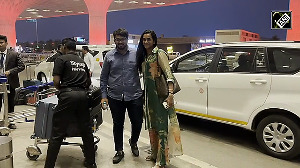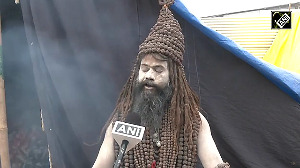Until a few years ago, the Indian Parliament would subject the Union Budget to comprehensive scrutiny by discussing its various provisions in both the Lok Sabha and the Rajya Sabha. The discussion would cover not just the broad fiscal proposals outlined by the finance minister but also the many expenditure programmes different central ministries would plan to implement during the year.
 True, Parliament could not complete the discussion on the expenditure demands made by many central ministries due to shortage of time. It would impose the customary "guillotine" before putting the entire Budget to vote a day or two before the end of the Budget session in May. However, the satisfaction then was that at least some discussion over the Budget's key expenditure proposals took place on the floor of either of the Houses of Parliament.
True, Parliament could not complete the discussion on the expenditure demands made by many central ministries due to shortage of time. It would impose the customary "guillotine" before putting the entire Budget to vote a day or two before the end of the Budget session in May. However, the satisfaction then was that at least some discussion over the Budget's key expenditure proposals took place on the floor of either of the Houses of Parliament.
The Atal Bihari Vajpayee government (1998-2004) brought about a significant change in that process. The logic of that change was understandable though it left many purists dissatisfied. The argument was that the prevailing system could never ensure conclusion of the discussion on all the expenditure proposals of different ministries before the passing of the Budget.
Thus, the exercise remained incomplete. An alternative system, therefore, was put in place by referring the key expenditure proposals of ministries to different standing committees of Parliament. These committees would study the proposals and submit their report to Parliament, which then would evaluate the recommendations and take a final view.
Since then all governments have been following the system of standing committees examining expenditure proposals of central ministries. There is now less debate on the Budget proposals on the floor of the two Houses. If you want to know how different Parliamentary committees have evaluated the key expenditure proposals of central ministries, all that you need to do is to consult these committee reports that are dutifully submitted to Parliament.
It is, however, a pity that most of these reports gather dust in the cupboards of the Parliament House. Worse, the government ignores the many recommendations these reports make and there is nothing in the system to ensure that such Parliamentary oversight actually results in corrective action on the ground.
The new system, to be sure, suits the finance ministry in particular and the government in general. The Union Budget now has expenditure proposals worth more than Rs 11 lakh crore or a little less than one-sixth of India's gross domestic product. Expenditure proposals of this size surely should receive some serious Parliamentary scrutiny before their approval for implementation.
The system of standing committees of Parliament examining these proposals may have harmed the process of scrutiny in two ways. One, the reports of these committees rarely get highlighted or debated in Parliament. Two, because the committees do the initial job of scrutinising the proposals, whatever attention members of Parliament would have otherwise paid in the earlier system also goes missing.
The system of Parliamentary standing committees scrutinising Budget expenditure proposals is something similar to the recent practice of the finance ministry issuing discussion papers on any fresh proposal it wants implemented. Like the standing committees, there are apparent advantages of getting a policy proposal discussed and debated after making public a discussion paper on the issue.
However, the disadvantages are quite serious and outweigh the advantages. Just as the system of standing committees takes away the direct responsibility of members of Parliament to vet expenditure proposals, discussion papers do not always elicit the kind of critical review that proposals should ideally receive before they become a policy of the government.
Because government officials are under the notion that once a discussion paper goes through the fire of public scrutiny, they can accept the proposals contained therein as policy without any problems. Little attention is paid to the fact that in India a discussion paper, even after remaining in the public domain for weeks, may not get evaluated properly from all possible angles.
Either some proposals in a discussion paper may become a victim of lobby groups, or some proposals that indeed suffer from loopholes fail to receive any feedback and, therefore, run the danger of being accepted as policy.
Discussion papers, like Parliamentary standing committees, can serve a very limited purpose.
Just as standing committees cannot supplant serious Parliamentary scrutiny of Budget proposals by members of the lower and upper Houses, discussion papers cannot be a substitute for reasoned assessment of policy proposals by the government, based on its interaction with and feedback from all relevant stakeholders including industry, trade and people.
At present, the finance ministry is grappling with two discussion papers and will soon have to wrestle with one more. The discussion papers on the introduction of the goods and services tax and the direct taxes code have established beyond doubt that while these documents can be the starting point of any policy discussion, they cannot do away with the need for the government's justification for policy change and its own vision on crucial policy issues. The same should hold true for the proposed discussion paper on the setting up of a financial stability and development council.







 © 2025 Rediff.com -
© 2025 Rediff.com -